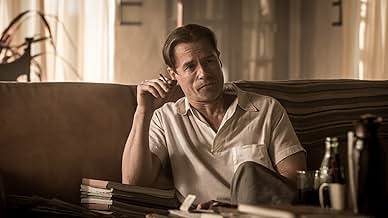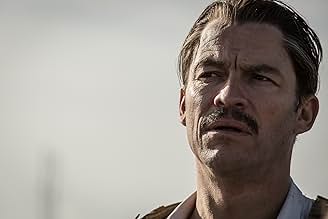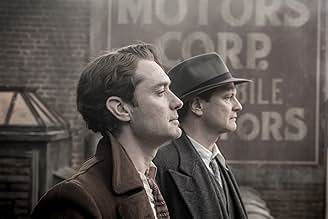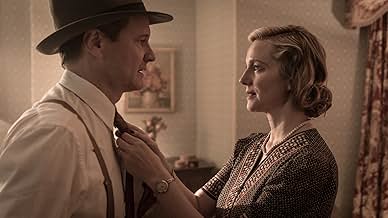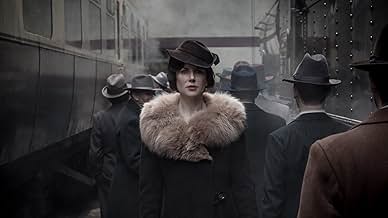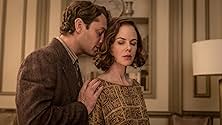Una cronaca del tempo di Max Perkins come editore di libri a Scribner.Una cronaca del tempo di Max Perkins come editore di libri a Scribner.Una cronaca del tempo di Max Perkins come editore di libri a Scribner.
- Premi
- 1 vittoria e 6 candidature totali
Angela Sant'Albano
- Bertha Perkins
- (as Angela Ashton)
Ray Strasser King
- James, Mailroom Clerk
- (as Ray Strasser-King)
Trama
Lo sapevi?
- QuizA. Scott Berg's biography "Max Perkins: Editor of Genius", on which the film is based, won the National Book Award in 1978.
- BlooperMaxwell Perkins tells Thomas Wolfe his book needs a new title that will appeal to potential purchasers, and gives the example of F. Scott Fitzgerald changing the title of a novel from "Trimalchio in West Egg" to "The Great Gatsby." The real Perkins, as Fitzgerald's editor, certainly would have known that "The Great Gatsby" was a flop upon its release in 1925 and did not sell well until the 1950s.
- Citazioni
Aline Bernstein: I don't exist anymore. I've been edited.
- Curiosità sui creditiThe title "Genius" appears on the screen 9 minutes into the movie.
- Colonne sonoreFlow Gently Sweet Afton
(Sottish traditional)
Composed by Jonathan E. Spillman
(1873)
Performed by London Voices
Recensione in evidenza
Director Michael Grandage's movie Genius about the relationship between legendary Scribners editor Maxwell Perkins and flamboyant author Thomas Wolfe has received generally tepid reviews. I for one am delighted an editor is finally receiving some screen time! Wolfe was an author whose moods, enthusiasms, and output were not easily corralled, even by someone with Perkins's experience. After all, he'd brought works to the public from other outsized personalities and authors with personal difficulties—notably Ernest Hemingway and F. Scott Fitzgerald.
It's easy to imagine the slammed door that would greet an author today who showed up with a 5,000-page manuscript as Wolfe did with his second book, Of Time and the River. The challenging task of turning this into a readable manuscript epitomizes the editor's dilemma, as Perkins puts it, "Are we really making books better, or just making them different?" Getting 5,000 pages down to a still-hefty 900 made it different, all right. And better, at least in the sense of more likely to be read, too.
Colin Firth, as Perkins, keeps his hat on during almost the entirety of the movie, symbolic perhaps of how his character tried to keep a lid on his difficult author. Jude Law as Wolfe is by turns outrageous, contrite, drunk, and sentimental. Pretty much like the novels, actually. His performance is consistent and always interesting. He shows Wolfe as a man with a lot of words bottled up inside him who couldn't always control the way they poured out.
It's odd to see an all-British and Australian cast playing so many titans of American literary history, including Perkins and Wolfe, Guy Pearce as Fitzgerald, and Dominic West as Hemingway. (The Hemingway scene necessitated an ending credit for "marlin fabricator.") The women in the lives of the protagonists are Laura Linney as Mrs. Perkins, perfect as always, and Nicole Kidman, who believably portrays the obsessed Mrs. Bernstein. She's left her husband to cultivate and promote the much younger Wolfe and is not lacking a flair for the dramatic herself.
The movie is based on the National Book Award-winning Perkins biography by A. Scott Berg, transformed into a screenplay by John Logan. New Yorker critic Richard Brody dings the script for its departures from the detailed and more richly peopled original, including the book's fuller explanation for the rupture between Wolfe and Scribners. While I disagree with some critiques of the filmed story, Brody says a lawsuit and Wolfe's unsavory political views played a part, and leaving the latter out seems a mistake. A fuller exploration of the break-up could have put some meat on the bones.
Portraying in cinema an intrinsically intellectual and abstract enterprise is difficult (The Man Who Knew Infinity struggled with the same challenge.) Like me, reviewer Glenn Kenny at Roger Ebert.com apparently had not read the book, so did not have Brody's reservations. Kenny found "the exchanges between editor and author exhilarating. Logan's script . . . is invested in the craft of words like few other movies nowadays, even those ostensibly about writers." Wolfe blasted onto the American literary scene like a runaway train and left it before he could accomplish a judicious application of the brakes. Yet, he eventually realized who'd kept him on track, as his moving deathbed letter attests.
It's easy to imagine the slammed door that would greet an author today who showed up with a 5,000-page manuscript as Wolfe did with his second book, Of Time and the River. The challenging task of turning this into a readable manuscript epitomizes the editor's dilemma, as Perkins puts it, "Are we really making books better, or just making them different?" Getting 5,000 pages down to a still-hefty 900 made it different, all right. And better, at least in the sense of more likely to be read, too.
Colin Firth, as Perkins, keeps his hat on during almost the entirety of the movie, symbolic perhaps of how his character tried to keep a lid on his difficult author. Jude Law as Wolfe is by turns outrageous, contrite, drunk, and sentimental. Pretty much like the novels, actually. His performance is consistent and always interesting. He shows Wolfe as a man with a lot of words bottled up inside him who couldn't always control the way they poured out.
It's odd to see an all-British and Australian cast playing so many titans of American literary history, including Perkins and Wolfe, Guy Pearce as Fitzgerald, and Dominic West as Hemingway. (The Hemingway scene necessitated an ending credit for "marlin fabricator.") The women in the lives of the protagonists are Laura Linney as Mrs. Perkins, perfect as always, and Nicole Kidman, who believably portrays the obsessed Mrs. Bernstein. She's left her husband to cultivate and promote the much younger Wolfe and is not lacking a flair for the dramatic herself.
The movie is based on the National Book Award-winning Perkins biography by A. Scott Berg, transformed into a screenplay by John Logan. New Yorker critic Richard Brody dings the script for its departures from the detailed and more richly peopled original, including the book's fuller explanation for the rupture between Wolfe and Scribners. While I disagree with some critiques of the filmed story, Brody says a lawsuit and Wolfe's unsavory political views played a part, and leaving the latter out seems a mistake. A fuller exploration of the break-up could have put some meat on the bones.
Portraying in cinema an intrinsically intellectual and abstract enterprise is difficult (The Man Who Knew Infinity struggled with the same challenge.) Like me, reviewer Glenn Kenny at Roger Ebert.com apparently had not read the book, so did not have Brody's reservations. Kenny found "the exchanges between editor and author exhilarating. Logan's script . . . is invested in the craft of words like few other movies nowadays, even those ostensibly about writers." Wolfe blasted onto the American literary scene like a runaway train and left it before he could accomplish a judicious application of the brakes. Yet, he eventually realized who'd kept him on track, as his moving deathbed letter attests.
I più visti
Accedi per valutare e creare un elenco di titoli salvati per ottenere consigli personalizzati
- How long is Genius?Powered by Alexa
Dettagli
- Data di uscita
- Paesi di origine
- Siti ufficiali
- Lingue
- Celebre anche come
- Daho
- Luoghi delle riprese
- Aziende produttrici
- Vedi altri crediti dell’azienda su IMDbPro
Botteghino
- Lordo Stati Uniti e Canada
- 1.361.045 USD
- Fine settimana di apertura Stati Uniti e Canada
- 98.274 USD
- 12 giu 2016
- Lordo in tutto il mondo
- 7.435.006 USD
- Tempo di esecuzione1 ora 44 minuti
- Colore
- Mix di suoni
- Proporzioni
- 2.35 : 1
Contribuisci a questa pagina
Suggerisci una modifica o aggiungi i contenuti mancanti








